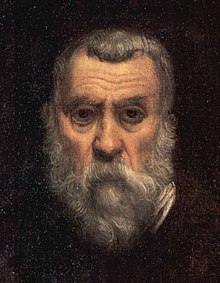Tintoretto
| Tintoretto | |
|---|---|

Detail of a self-portrait
|
|
| Born |
Jacopo Comin late September or early October 1518 Venice, Republic of Venice, in present-day Italy |
| Died | 31 May 1594 (aged 75) Venice, Republic of Venice, in present-day Italy |
| Nationality | Italian |
| Known for | Painting |
| Movement | Renaissance |
Tintoretto (Italian pronunciation: [tintoˈretto]; born Jacopo Comin, late September or early October, 1518 – May 31, 1594) was an Italian painter and a notable exponent of the Renaissance school. For his phenomenal energy in painting he was termed Il Furioso. His work is characterized by its muscular figures, dramatic gestures, and bold use of perspective in the Mannerist style, while maintaining color and light typical of the Venetian School.
In his youth, Tintoretto was also known as Jacopo Robusti as his father had defended the gates of Padua in a way that others called robust, against the imperial troops during the War of the League of Cambrai (1509–1516). His real name "Comin" has only recently been discovered by Miguel Falomir, the curator of the Museo del Prado, Madrid, and was made public on the occasion of the retrospective of Tintoretto at the Prado in 2007. Comin translates to the spice cumin in the local language.
Tintoretto was born in Venice in 1518, as the eldest of 21 children. His father, Giovanni, was a dyer, or tintore; hence the son got the nickname of Tintoretto, little dyer, or dyer's boy, which is anglicized as Tintoret. The family originated from Brescia, in Lombardy, then part of the Republic of Venice. Older studies gave the Tuscan town of Lucca as the origin of the family.
In childhood Jacopo, a born painter, began daubing on the dyer's walls; his father, noticing his bent, took him to the studio of Titian to see how far he could be trained as an artist. This was supposedly towards 1533, when Titian was already (according to the ordinary accounts) fifty-six years of age. Tintoretto had only been ten days in the studio when Titian sent him home once and for all, the reason being that the great master observed some very spirited drawings, which he learned to be the production of Tintoretto; and it is inferred that he became at once jealous of so promising a scholar. This, however, is mere conjecture; and perhaps it may be fairer to suppose that the drawings exhibited so much independence of manner that Titian judged that young Jacopo, although he might become a painter, would never be properly a pupil.
...
Wikipedia
